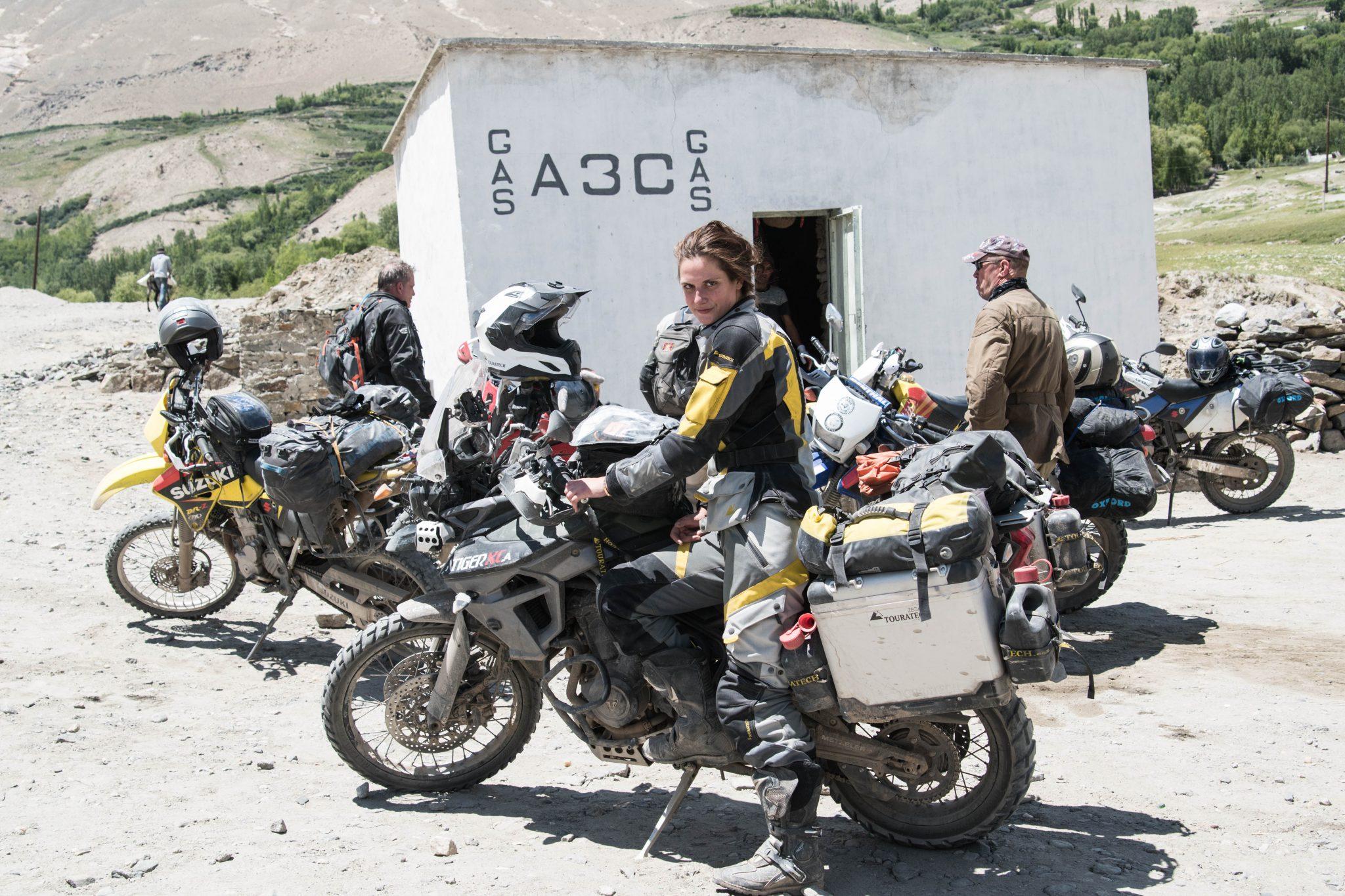
Ditching the ‘Babes’: Women ADV Riders Taking up Space
BY EGLE GERULAITYTE
While Elspeth Beard was definitely a rock star motorcycling around the world in the 80’s, are we still heroines just because we ride? Can we finally skip ‘the female factor’ and just concentrate on exploring the world on two wheels? Is the world more dangerous for us? What’s the real definition of adventure?
We invited seven daredevil ladies to answer five questions about what it means to be a female ADV rider today. They hail from different countries, ride different bikes, and travel different corners of the world – but they all agree on quite a few things!
Elisa Wirkala (USA), Lea Rieck (Germany), Alison DeLapp (USA), Asta Dovydėnaitė (Lithuania), Heather L. Johnson (USA), Aleksandra ‘Ola’ Trzaskowska (Poland) and Sue Barnes (UK) discuss how women are perceived in today’s world of ADV riding.
– A few decades ago, setting out on a round the world journey on a motorcycle was a huge deal for anyone – but especially so for women. Fast forward to Tiffany Coates and Lois Pryce showing once and for all that women riders are just as capable; yet it seems that today, we’re still proving it. Do you think we need that – to be considered heroines just because we’re women?
ALISON: The reality is that although it appears there are more women riders out there, there aren’t. As women (and men too, but for different reasons) we notice the headlines because it’s another female out there.
For example, on my solo trip around southwest US in 2010, I didn’t encounter any female riders, but I certainly had women tell me “If you were my daughter, I wouldn’t let you do that’. On my solo trip to Alaska in 2011, I didn’t meet any single female riders at all (but heard about one). In 2012-2013 during my solo trip through Latin America, of the 35 riders I met, there was only one other female biker who happened to be solo.
So, unfortunately, you can’t skip the part about being female. It’s a part of who we are and need to embrace it for what it’s worth. On my Latin American trip, I wore men’s gear to “try to blend in” but all I had to do was take off my helmet and the busy bee locals were swarming around me.
Another thing is, being an outspoken woman traveler isn’t necessarily about us. It’s about the places we are traveling and maybe planting the idea they don’t have to abide the social norms. As women riders, we’ve already rejected the social norms, even if it hasn’t been accepted by everyone. I still get surprised looks on guys faces and the dumb question “you ride?” when I start chatting with them about gear or motorcycles, because I don’t feel like I always have to introduce myself as, “Hi, even though I am a woman, I’m traveling around the world on my motorcycle’! And this isn’t even in third world countries – this is the US!
ELISA: I’ve thought about this a lot, and have sometimes felt very embarrassed for using catchy gender-specific phrases like that. First off, we’re not girls. We’re women, and we shouldn’t feel the need to infantilize ourselves because it sounds better or sells more articles!
But the truth is, women riding motorcycles still piques a lot of interest, even if it is becoming more common. And ‘girls’ on motorcycles is even more attention grabbing… no matter how badly we cringe at it.
And while yes, I may still use phrases like that sometimes, I would never use the word heroic to describe what I’m going. There’s nothing inherently noble about riding long distances except perhaps that it takes a certain level of courage, or at least a whole lot of wanderlust. Heroic means there’s some exceptionally virtuous quality about what you’re doing, and I just don’t see motorcycle riding as hitting that mark.
It’s a big undertaking for anyone, man or woman, regardless of the fact lots of other people have done it. And the rider, regardless of gender, might be giving something that was never even intended: they might very well be sharing their passion with others who might follow in those steps someday or sharing the world and journey with those who aren’t able to. They might be helping to bridge cultures and unite communities in a small but meaningful way or act as role models. They may be ambassadors of their countries and cultures. And sometimes, very occasionally, a rider may do something so meaningful for the communities they are traveling through as to be considered heroic.
But as for being considered a heroine just because you’re a girl on a bike? I for one hope those days are numbered because I’d like to live in a word where any female feels they can have a long, squiggly adventure across continents.
LEA: I think we are far away from skipping ‘the female factor’! The motorcycle community is very male dominated, and when traveling, I mostly met other guys and only a few couples going on longer trips. During five months of my round the world journey so far, no other solo female rider crossed my path.
In general, I experienced other motorcyclists to be very helpful and supportive. But at the same time, there were incidents that would not have happened if I was a man. Once, I drove with a guy that couldn’t keep up with me as soon as we hit some curves. I’m not a speed maniac; I simply enjoy going over bends faster because my skills and experience allow me to. When we stopped, the guy accused me of driving irresponsibly and not having my bike under control! Crossing Kazakhstan, I rode with a very inexperienced Russian motorcyclist who kept trying to ‘fix’ things on my bike, even though it was evident that I was much better informed about my motorcycle. Eventually, as his luggage kept getting loose and falling off his bike all the time, I offered him some spare straps – and he refused indignantly.
As long as people are still surprised when you take off your helmet, and they realize you are a woman, and as long as it’s still unusual to see women on bikes traveling alone, I think every female adventure rider counts!
OLA: Even nowadays, it’s far harder to travel alone as a woman because of cultural and other factors. So yes, women riders are still heroines in my book! On the other hand, I think the type of riding matters, too. You can fairly easily go round the world on safe, easy paved roads, sticking close to the civilized parts where you can always find help. But if they choose to ride hard off road, wander off the beaten path, dare to explore the most remote corners of the earth – then that’s impressive!
SUE: I would define myself as ‘an adventure rider,’ period. I wouldn’t include the term ‘woman’ or ‘female.’ However, I think there is quite a bit of difference between male and female adventure bikers!
For starters, we are generally physically weaker, we tend to have fewer mechanical skills and less money, and we tend to need to work much harder at keeping ourselves safe!
I can, and do, ride alone, but I generally, prefer the company of other riders, especially if I’m traveling abroad. To my mind, it helps reduce the risk regarding personal safety, resolving difficult situations, and helps to keep costs down. Also, possibly, women are a bit more social, we love to chat, and it somehow feels more important for women to share the pleasure of being in a beautiful place or just to share the adventure with another person.
An interesting thing I have noticed, is that often when traveling, the conversation will swing to questions about how can I afford to make the trips I do? Other people seem to think it’s ok for men to go off on long motorcycle trips and although people might quietly wonder how men can afford the time and expense, they don’t ask.
With women adventure bikers, it seems to be ok to openly inquire about a woman’s finances and status. So, we need to be prepared to justify this, or, divert the question in some way? I would never own a big, heavy, expensive, bike anyway, but, if I did, I know I would be asked questions about my financial status even more.
HEATHER: Sadly, as long as women must fight for their civil rights I think the majority of people will continue to view solo women motorcyclists, particularly distance riders venturing into “other” territories (i.e. countries outside a given perceiver’s own), as somewhat novel or “heroic.” This seems to lessen with our increasing numbers and buying power; perhaps when the motorcycle industry finally caters to as many women as men, we will eventually be taken as seriously as male riders – simply as independent and capable adventurers!
Meanwhile, how we are received by the populations of countries we travel through is another matter. One of the most gratifying aspects of my travels came from changing people’s perceptions, incrementally, while out on the road. I was rarely harassed or disrespected by men I encountered because they were so often just flabbergasted.
ASTA: thanks to those legendary ladies, the motorcycling world is now open to every woman who wishes to get in the saddle and ride. On the other hand, motorcycles are still largely a man’s world – they are created by men, designed for men and still mostly ridden by men. I like being a part of this relatively small community of women riders. I am a woman, and I cannot and don’t want to ‘skip’ that.
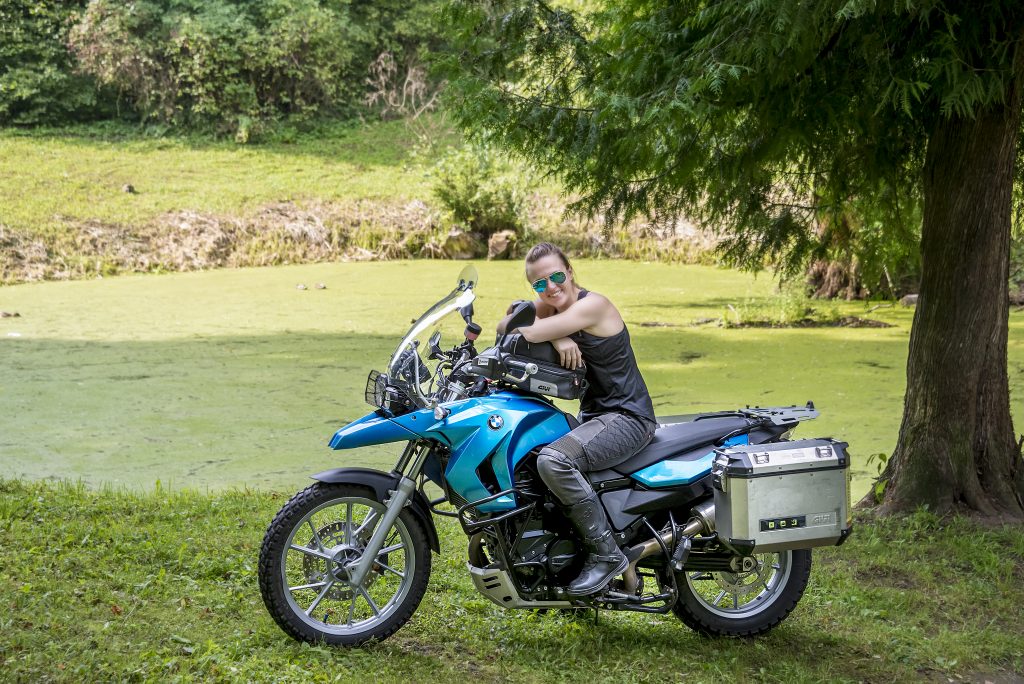
– Being a woman rider – especially if you’re riding alone – sometimes is an advantage: if there is a ‘girl biker’ or ‘solo female rider’ in the title of a blog post or a magazine article, your chances of getting publications, views, and sponsorships improve significantly. At the same time, there is a certain assumption that things are easier for us ‘just ‘cause we’re girls.’ What’s your take on this?
ASTA: I have my advantages of being a woman and I’m happy to use them. By being female riders, we are a comparably rare and exciting thing, so why not use it to our advantage!
HEATHER: In my case, this has been true. I have not hidden my stature as a petite female solo rider and have benefitted from that, because it still, in so many minds, makes a better story. When I pitch for opportunities, I focus on storytelling and how the experiences I bring back home can positively affect the lives of others – which I think helps. On the road, being a Caucasian North American female has been a “double-edged sword,” to abuse the cliche. I must abide by cultural norms that restrict me in many ways. But if I need help, I get it quickly – this is not something I’ll ever be ashamed of.
ALISON: How to handle the scrutiny of being a woman and getting sponsored because of it? You have to say, fuck it, and do what you want. My usual reply is, “Yeah, so?”
There will be those who are jealous of the advantage we have, but look at all the advantages men have over women!
Maybe I’ve been living in Latin America for too long, but I enjoy when a guy gets the door for me or helps me pick up my bike. I used to have to prove to myself that I could do it alone and I didn’t need help. But when I realized I was not a damsel in distress and was very capable of doing anything myself, I started to accept the help from others. It’s part of the motorcycle camaraderie to help each other out, and I learned to accept the added benefit to being a woman who knows how to pick up my bike but letting someone else do it. Thinking about it in terms of power, I’m giving them the power to help me. Same goes for the mechanics on my bike. I happen to work on my own bike, yet men won’t accept I know how and always want to teach me, so I let them. Sometimes I learn a thing or two and do it better next time, then again sometimes I don’t and end up correcting them.
LEA: Many times, I was told „oh, it’s so much easier to you because you are a girl!’, regardless if the topic was people being more helpful when traveling or sponsorships. I totally disagree with this! The people claiming such things usually forget that it took most of us „girls” much more effort to be able to get where we are now. I worked hard for building the network I have now, and I didn’t get my sponsorships simply because I am a female. I got them because I am very well connected, because I am addressing a target group many brands are interested in, and because I knocked on many doors. Nobody is waiting for you to give you their products for nothing. You have to offer something that they want: connections, an exciting story – or both, and your gender doesn’t matter.
OLA: I agree, sadly, this stereotype still exists. But in my experience, when it comes to getting sponsorships, it’s actually more difficult if you’re female. As women motorcyclists, we’re already very far from the ‘traditional,’ ‘typical’ image of a woman, so companies are not interested in us because we do not represent the mainstream image. Shockingly, sometimes there’s a female envy factor, too. I wouldn’t say it’s a rule, but unfortunately, I have experienced this.
ELISA: I’ve had the good fortune of not receiving many negative comments like this, but I’ve had more guys than I’d like to admit put me down for riding small bikes, saying things like “that’s hardly a motorcycle.” When I do hear stuff like this, I have the impulse to suggest they go try riding a 125 through Andean snowstorms, or across the brutal winds of Patagonia.
On the flip side, most people are incredibly supportive and have asked why I haven’t looked into getting bigger sponsorships. Maybe someday I will, but until now, I don’t feel I’ve done anything to really deserve them. And I don’t want them to change the way I do things.
SUE: I have self – funded all of my trips: no sponsorship or the like! I think to get sponsorship as a woman, it’s preferable to look a certain way….I don’t look like that. Also, I can be a bit of a nonconformist and think I would struggle to do what I want to do on my adventure if I had to consider the demands of a sponsor. I just want to go and get on and ride!
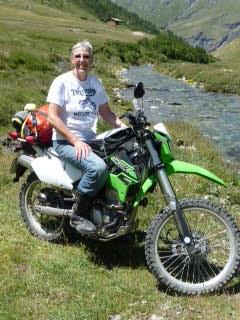
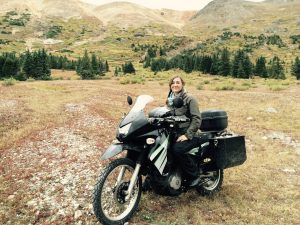
– It sometimes seems that for men, riding around the world is about the size of their cojones – they want ‘defeat’ and ‘conquer.’ For women riders, it’s more about observing and reflecting on the people, the cultures, and nature. Agree or disagree?
ELISA: Disagree. I think both men and women are often out looking for the same thing. To test their limits, push their boundaries, and also have time for observation, reflection and personal growth. I don’t think this is gender specific. Sure, some people are more or less introspective than others, but I think it’s merely a bi-product of our culture that some men don’t feel they’re able to, or just don’t want to share these more sensitive, personal thoughts and moments. But I believe they’re present in all of us to some degree, whether we share them or not. If women aren’t using that same terminology, it’s likely because we’re often less aggressive by nature, and less to do with differences in inward reactions to what we experience and observe.
ASTA: think about it, men’s roles have recently significantly shifted: their job used to be to chop wood, make fire, and hunt to bring dinner home. Now, they’re stuck in offices and in front of computer and TV screens. So it’s only natural they want to defeat and conquer something – even if it’s just a nasty patch of gravel.
Women didn’t have to fight dragons – they tried to domesticate them. So if they ride, they’re already doing something exceptional and can concentrate on different, more subtle things.
Then again, everybody different – I’m sure some women riders are out to defeat and conquer, as well as guys who are more into quiet reflection. The best thing about motorcycles is that they connect people – men or women, young or old, out there riding regardless of what they’re after.
ALISON: The difference between the thinking of men and women will never fully be understood. I don’t agree nor disagree since data can’t be gathered to back up either view.
LEA: in my opinion, there are countless different ways and approaches on traveling. And everybody has to find his or her own. For some, it’s all about testing the size of their cojones and riding the biggest and fastest bike; for others, it’s traveling as many countries as possible; for some, it’s about spending as much time in a country as possible. I don’t think those goals are better or worse, and I doubt that experiences can be ‘male’ or ‘female.’
OLA: I know a lot of women (myself included) who want to be the fastest, the toughest, and the most extreme! I think, most of us are pretty tough whether we realize it or not because it’s simply impossible to survive out there if you’re a fragile, delicate little soul in this rather masculine world of motorcycling.
On the other hand, I noticed that women usually don’t try to compete with other women – they know their value and it’s enough. I think that’s very positive.
SUE: I think many more women travel more to challenge themselves, to learn, to link up with other people and to experience different cultures. Maybe more so than the average man. I have never met a woman ADV rider who wanted to travel the fastest, the coldest, the most difficult, or on the biggest bike.
HEATHER: There is an undeniable camaraderie between male riders that ranges from expressions of brotherhood to pissing contests, but I’ve known many who have great respect for what they learn from the road and who care very much about how others receive their photos, blogs, ride reports, Facebook posts, etc. These are guys who are out to prove something to themselves – as opposed to showing off to others.
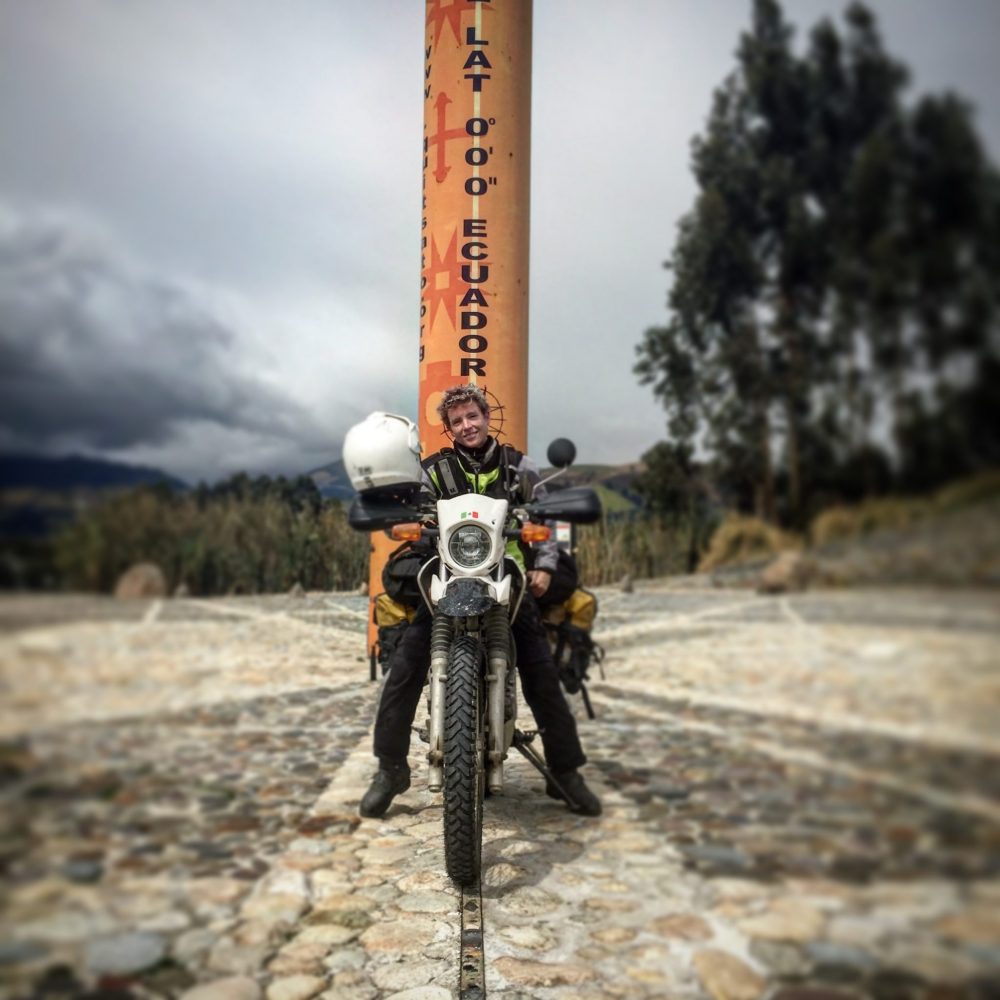
– Is the world more dangerous for women? If so, does that make us braver than men?
ASTA: I don’t think the world is dangerous. The world is full of wonderful people and that’s what I want to prove to myself during my travels. Do I feel brave? I guess I do. Am I more courageous than male riders I know? Probably not. But I think that’s what makes it even more satisfying – knowing that I may be scared to death in some situations, but still getting there and having it done.
HEATHER: Based on what I’ve experienced so far (in the Americas), no. I take precautions where I need to and minimize interactions with people who don’t feel right. I stay away from remote territories where it’s harder to get help, and I’m extremely cautious in heavily touristic areas where violence toward women is known to occur. In my case, being female has often been an asset; as long as I am humble when asking for help, I usually get it quickly.
ALISON: Yes, the world is more dangerous for a woman. Not just in the physical sense, but the way the world looks at a woman. I do not want to bring politics into motorcycling, but look at who the US just elected as president! Men can get away with disrespecting women while the reverse isn’t true and I’m still referring to first world countries which are seen as “progressive.” I have a lot to say about that, but it will probably end up as a huge rant!
ELISA: Short answer, yes. As a woman who has had her share of sexual harassment while traveling (like most women who have experienced at one time or another), the world does feel more dangerous. Unfortunately, it’s us females who are the recipients of sexual violence, which is one of the things that scare me the most about solo travel.
There’s ample literature on gender differences and aggressive behavior, so being a female traveler through male-dominant countries carries inherent risks. There are also studies that show women are more risk averse in general, though, and I’ve often wondered if I was born without this particular feminine quality. Has this led me down the path of a more adventurous lifestyle, or has the fact that women are more risk averse actually helped me navigate dangerous places more wisely and more cautiously than some of my male counterparts?
LEA: Yes and no. Unfortunately, it is still more likely to get sexually harassed as a woman than as a man, for example. But so far, I only had good experiences. I felt that mostly, people want to protect you when they realize that you are a woman traveling alone. I never felt threatened by anyone. In general, as a solo traveler you have to listen to your gut feeling. Better safe than sorry. And a good thing about traveling on a motorcycle is that you just take off if you don’t feel safe in a particular place. There have been areas where I chose not to stay overnight alone– but then 50 miles later, I’d find the nicest home stay imaginable.
SUE: yes, I do think the world is more dangerous for women, but possibly not as dangerous as people might think. Also, I believe women are treated quite differently, depending on how they look, how they behave, their age, confidence, and so on. I think that sometimes, our vulnerability can work in our favor: for example, I have had people be so amazingly kind to me on the road because they think I am much more vulnerable as a woman and their need to support has been greater.
OLA: yes. It’s a simple historical and cultural issue: for thousands of years, women played the role of a housewife, and very few of them ever set out on adventures that were perceived as ‘masculine.’ And it’s still true today in a lot of traditional cultures and societies around the world.
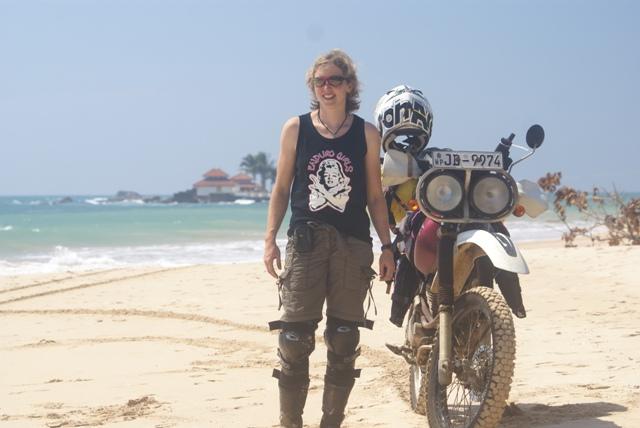
– Is it the motorcycle that makes you adventurous, or were you always that way and the motorcycle is just another means of getting to know the world?
ASTA: I rode horses since I was a kid, so motorcycles felt like a natural step forward. Being adventurous is in my genes – my dad used to compete in rallies, and my mom is pretty wild in general, so no-one was ever surprised with my choices! But when it comes to traveling, motorcycles have changed me. Before, I could barely explain how to get to my friend’s house a couple of hundred miles away. Now, as I’m riding further and further, the map in my head is being filled with colors, smells, and people I meet on the road.
ELISA: Adventuring is in my blood. I was raised on stories of my dad hitchhiking from the United States to Brazil in the 60’s, and my mom sewing up her own backpack and sleeping bag to hitchhike around Argentina when she was only 19 years old. Decades later, they were taking themselves on safaris across the Kalahari in a rented 4×4, sleeping in lion country, fording rivers, or hanging out around the fire with the Shuar Indians (who shrunk their last head in the 70’s, I believe) of the Amazon.
So it’s no surprise that since I was a little girl, I dreamt of being Indiana Jones and having wild adventures of my own. A motorcycle is just another way of seeing the world from a different perspective, and one of my favorite ways. I still enjoy long distance treks, cycling tours, sports climbing and nowadays even some mountaineering, to balance out sitting on a motorcycle for so many thousands of miles.
OLA: I have never thought of myself as particularly adventurous: I have always lived that way – I’ve always liked sports, traveling, and exploring. So riding my bike in some remote corner of the world just feels natural. What some people may consider very adventurous or extreme is a norm for me, and what I find very adventurous or extreme is probably the norm for other people. I don’t think there’s a limit!
HEATHER: Learning to ride a motorcycle – which happened to me late in life, at age 37 – liberated me by making me realize how much more I was capable of accomplishing in general. Per my size, I grew up thinking riding wasn’t an option. Once I proved myself wrong, I found the gumption to crash through all kinds of other doors, in terms of how I live my life and the art I make.
ALISON: My world changed when I realized that I could combine my two loves: motorcycling and traveling. I’ve been a traveler my whole life and a motorcyclist for a half, so doing it together was a normal transition for me. I respect those who just use it as a means of transport, but I think they are missing out on half of the experience.
A motorcycle lets you have control over where you go, what you see, and allows you to explore beyond the normal routes. Yet at the same time, you have no barrier from the outside world so you become vulnerable to the elements, to people, to traffic. It’s not for the weak-hearted or mild-mannered, although I started out that way, but in the end gained a lot of independence because of it.
LEA: I always loved exploring the world and had traveled alone for years both on the bike and by different means.
The combination of getting to know the world and being on a bike is just unbeatable, though. For me, sometimes it’s not just about getting to know the world – sometimes, it’s about biking, about the best curves, about the fun when being on a motorcycle. And I can only experience the pure thrill of this when I’m on two wheels.
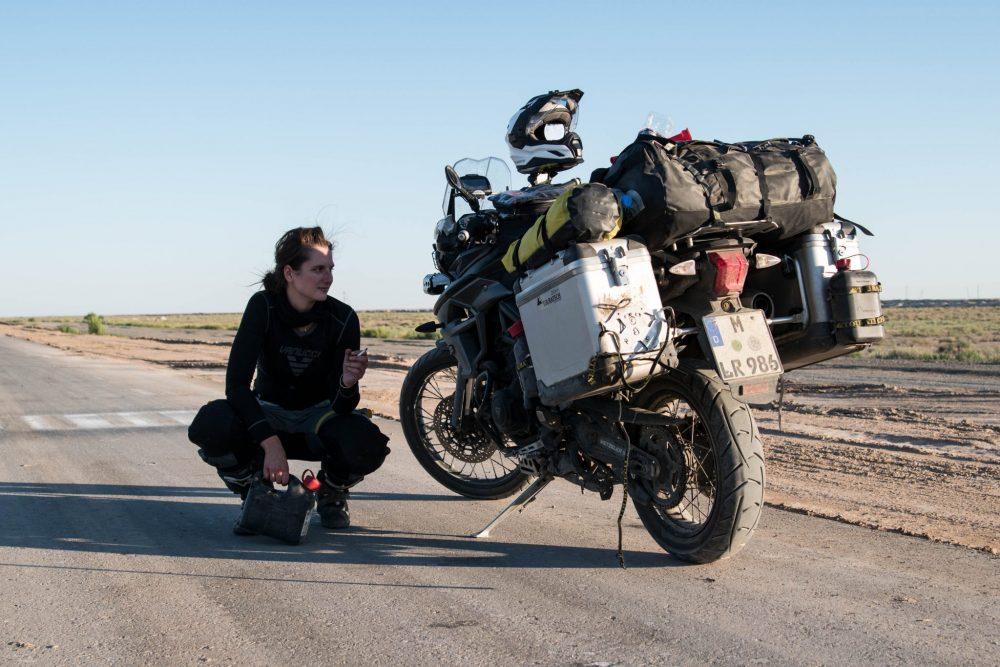
Want to join the conversation? Have your say in the comment section below!

2 comments
What great and interesting statements!
I rode the Americas solo last year and had so many great encounters. And heard the word “heroe, brave” and “inspiration” many times…both from men and women. I will go on traveling solo as much as I can. Not because I feel heroic but because I love to do what I do. And I guess that’s all that counts. And yes, it would be great to meet more women on bikes 😀
Great article, I’m hay to read about all you women travellers achieving so much and believing in yourself! Women’s International Motorcycle Association, WIMA, started more than 60 years ago to support women riders globaly and it still does. We might take riding a motorbike for granted in the west but for women in other parts of the world it is still something very rare and a courageous thing to do. To say anything else would be to diminish the effort of the many female pioneers still out there.